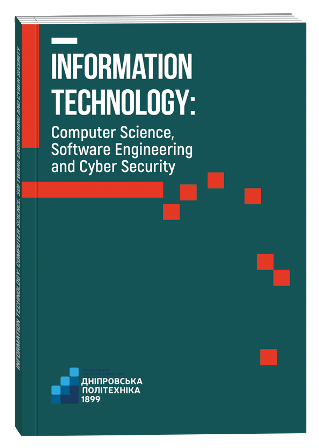INFORMATION TECHNOLOGY FOR RECOMMENDATIONS OF USER PROFILES BY COMMON INTERESTS FOR THE SOCIAL NETWORK
DOI:
https://doi.org/10.32782/IT/2024-2-14Keywords:
information technology, recommender system, user profiles, sets of features, hybrid filteringAbstract
The article describes the solution to the problem of providing user recommendations in social networks. The purpose of the work is to develop information technology for providing recommendations of user profiles for a social network. Methodology. This work uses the methodology of system analysis to build a functional model of information technology, graph theory to represent the structure of a social network, methods of collaborative, topological, and content filtering to develop a hybrid filtering method. The scientific novelty of the research lies in the fact that, unlike existing models of providing recommendations based on the data of social network user profiles, when choosing the optimal recommendation algorithm, not only the accuracy of the recommendations, but also the complexity and resource consumption of the algorithm were taken into account. The developed information technology for recommending profiles uses a combination of three filters: content, collaborative, and topological. Each of the filters applies the calculation of the Jaccard similarity coefficient. To combine different filtrations, a hybridization strategy based on a weighted sum was used, where the weight of each filtration is equal to one. Information technology is implemented in the recommendation system, implemented in the form of a software module in the JavaScript language. The developed recommendation system is integrated into a previously created social network. The system accepts as input the data of the authorized user and the data of candidate users in recommendations in the form of vectors or sets of features. Next, the system analyzes the input data using hybrid filtering recommendation algorithms. Based on this analysis, an array of recommended profiles for the current user is formed. Conclusions. An information technology for providing recommendations of user profiles in social networks is proposed, which is built on the basis of the hybrid filtering method, which allows to increase the reliability of providing recommendations.
References
Silva N. B., Tsang I., Cavalcanti G. D.C., Tsang I. A graph-based friend recommendation system using Genetic Algorithm. IEEE Congress on Evolutionary Computation. 2010. P. 1–7. https://ieeexplore.ieee.org/document/5586144
Reddy V. S., Kumar K. K. An Efficient and Improved Algorithm for a Recommender System to Detect & Recognize Communities in Social Networks. International Journal on Recent and Innovation Trends in Computing and Communication. 2023. № 11 (9s). P. 675–679. https://doi.org/10.17762/ijritcc.v11i9s.7481
Cheng, S., Zhang, B., Zou, G. et al. Friend recommendation in social networks based on multi-source information fusion. International Journal of Machine Learning and Cybernetics. 2019. № 10. P. 1003–1024. https://doi.org/10.1007/s13042-017-0778-1
Isinkaye F. O., Folajimi Y. O., Ojokoh B. A. Recommendation systems: Principles, methods and evaluation. Egyptian Informatics Journal. 2015. № 16. P. 261–273. https://doi.org/10.1016/j.eij.2015.06.005
Song X., Lian J., Huang H. Friend Recommendations with Self-Rescaling Graph Neural Networks. ACM SIGKDD Conference on Knowledge Discovery and Data Mining. 2022. P. 3909–3919. https://dl.acm.org/doi/10.1145/3534678.3539192
Парфененко Ю. В., Ковтун А. А., Вербицька А. А. Рекомендаційна інформаційна система для пошуку відеоматеріалів. Вісник КрНУ імені Михайла Остроградського. 2019. № 5 (118). С. 97–102. https://doi.org/10.30929/1995-0519.2019.5.97-102
Abbaschian B., Khorshidi S. A Review of Hybrid Recommender Systems. Journal of Interdisciplinary Research. 2017. P. 259–263.
Мелешко Є. В. Семенов С. Г., Хох В. Д. Дослідження методів побудови рекомендаційних систем в мережі інтернет. Системи управління, навігації та зв’язку. Збірник наукових праць. 2018. Т. 1 (47). С. 131–136. https://doi.org/10.26906/SUNZ.2018.1.131
Samad A., Azam M., Qadir M. Structural Importance-based Link Prediction Techniques in Social Network. Endorsed Transactions on Industrial Networks and Intelligent. 2021. P. 1–13. https://eudl.eu/doi/10.4108/eai.7-1-2021.167840
Kadam S., Bhattacharya R. Predicting future link in social network: A review. International Journal of Health Sciences. 2022. 6(S2). P. 8232–8240. https://doi.org/10.1016/j.jnca.2020.102716
Chen L., Xie Y., Zheng Z. Friend Recommendation Based on Multi-Social Graph Convolutional Network. IEEE Access. 2020. № 8. P. 43618–43629. https://doi.org/10.1109/ACCESS.2020.2977407
Da’u A., Salim N. Recommendation system based on deep learning methods: a systematic review and new directions. Artificial Intelligence Review. 2019. № 53. P. 2709–2748. https://doi.org/10.1007/s10462-019-09744-1
Liu J., Yi H., Gao Y., Jing R. Personalized Point-of-Interest Recommendation Using Improved Graph Convolutional Network in Location-Based Social Network. Electronics. 2023. № 12(16). P. 3495. https://doi.org/10.3390/electronics12163495
Sathre P. A., Gondhalekar W., Feng. Edge-Connected Jaccard Similarity for Graph Link Prediction on FPGA. High Performance Extreme Computing Conference. 2022. https://doi.org/10.1109/HPEC55821.2022.9926326







